The Best 10 Alternatives to CloudFloorDNS (+ Pricing & Reviews)
Twingate Team
•
Jul 27, 2024

CloudFloorDNS offers a range of DNS-related services, including Managed DNS, Secondary DNS, DNS Failover, GEO DNS, and Domain Registration. While their services are robust, they may not be suitable for everyone. This article explores the importance of secure access to private resources for distributed workforces.
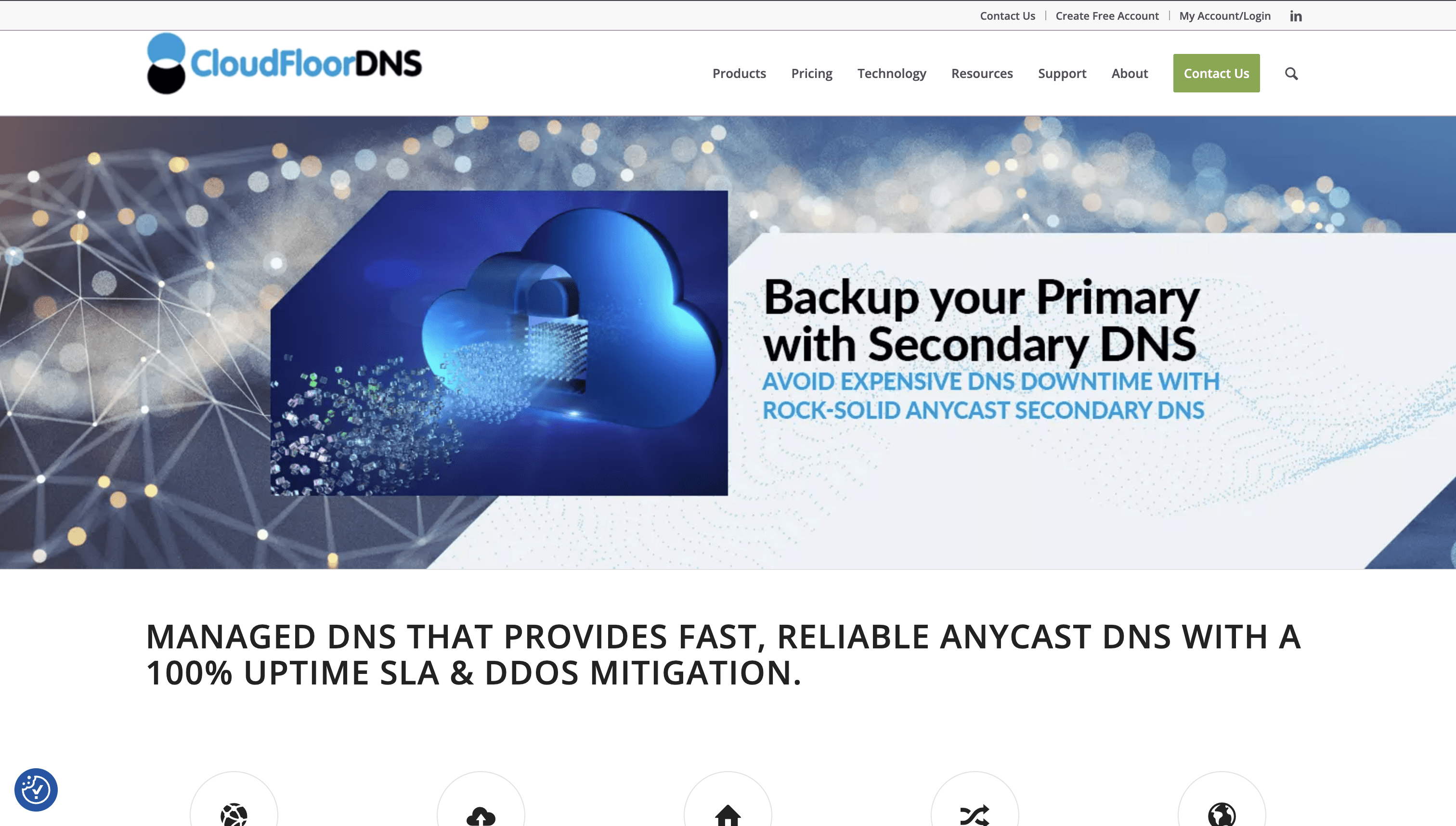
10 Alternatives to CloudFloorDNS
1. Twingate
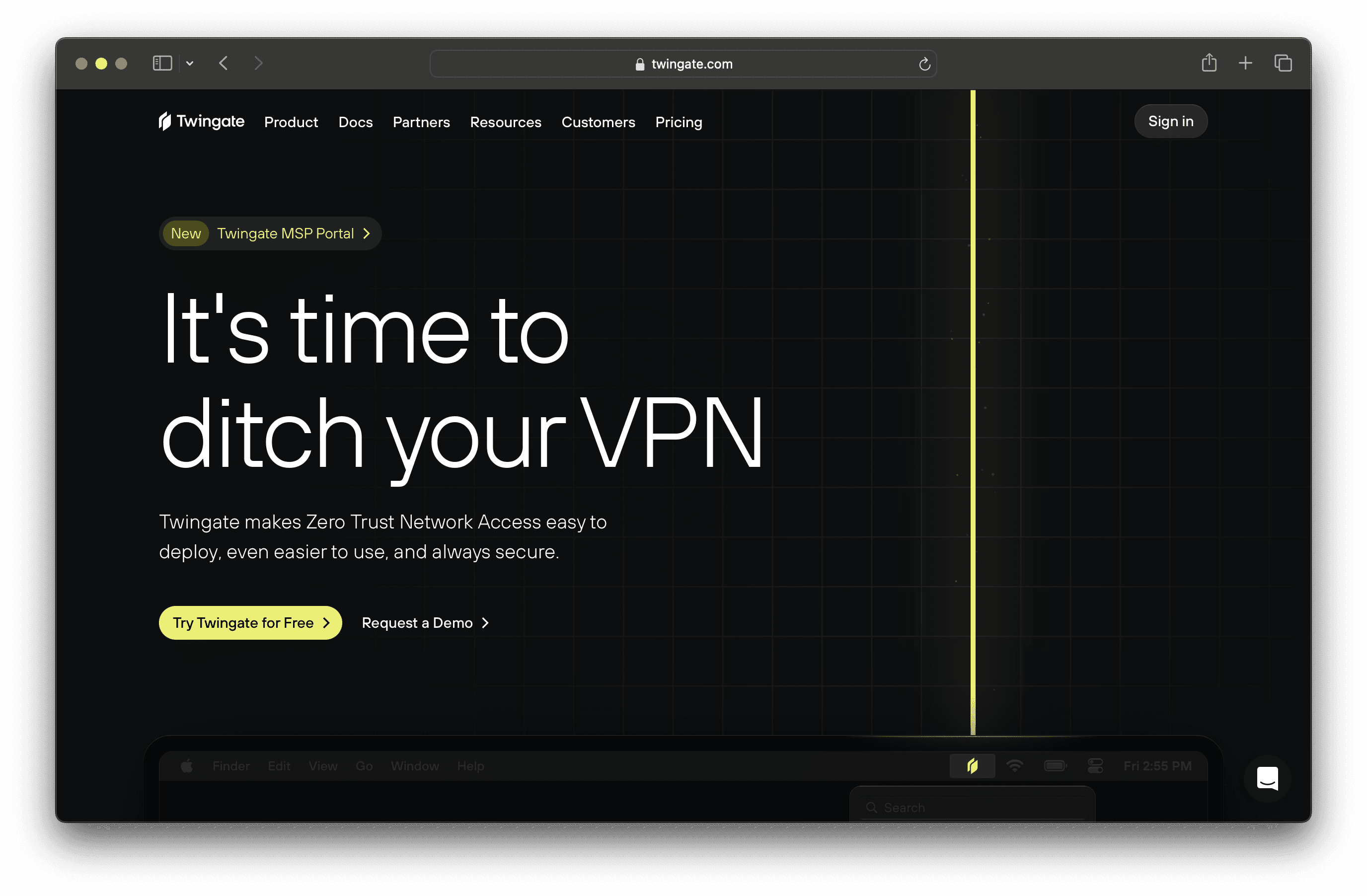
Twingate is a network security solution designed to replace traditional VPNs for remote access, offering a zero-trust security model and seamless deployment alongside existing infrastructure. With a focus on ease of use and scalability, Twingate aims to provide a secure and maintainable solution for businesses of all sizes.
Twingate Pricing
Starter: Free per user/month
Teams: $6 per user/month (monthly), $5 per user/month (yearly)
Business: $12 per user/month (monthly), $10 per user/month (yearly)
Enterprise: Custom pricing per user/month
Twingate Reviews
Twingate has an overall rating of 4.7 out of 5 stars based on 63 reviews. Users praise its ease of setup and high security. Check out more of our reviews here!
Pros and Cons of Twingate
Pros:
Seamless integration with existing infrastructure, making it easy to deploy without disrupting current systems.
Zero trust security model ensures that only authenticated users can access private resources, enhancing overall security.
High user satisfaction with ease of setup and use, reducing the learning curve for new users.
Cons:
Some users report occasional performance issues, which can affect the reliability of remote access.
Limited customization options may not meet the specific needs of all organizations.
Logging issues have been noted, potentially complicating the monitoring and auditing of access activities.
2. NextDNS
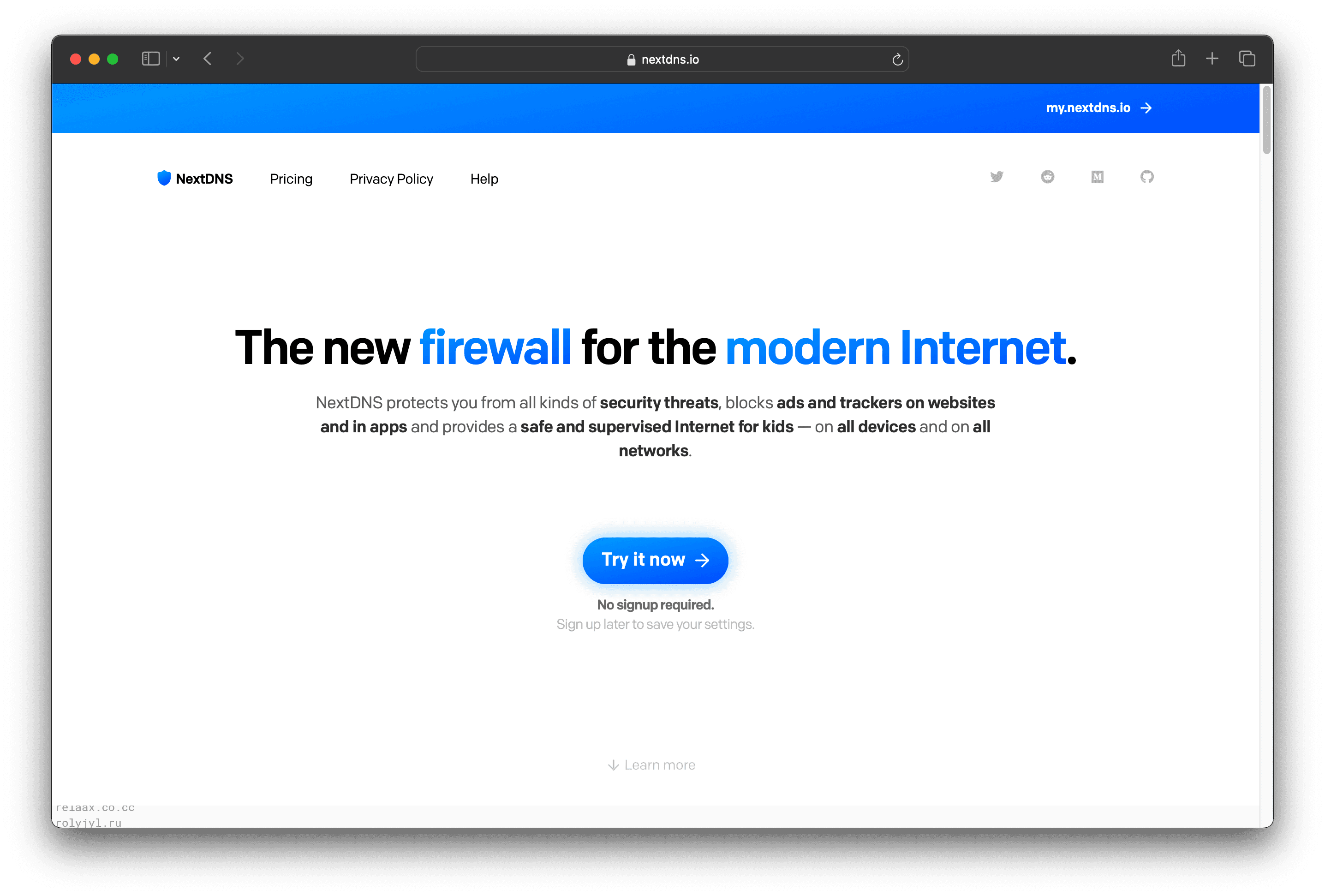
NextDNS is a modern DNS service designed to enhance online privacy and security. It offers customizable filtering, analytics, and protection against malicious sites. With a focus on ease of use and comprehensive features, NextDNS aims to provide a secure browsing experience for individuals and organizations alike.
NextDNS Pricing
Free Plan: $0/month
Pro Plan: $1.99/month or $19.90/year
Business Plan: $19.90/month* or $199/year* (* for every 50 employees)
Education Plan: $19.90/month* or $199/year* (* for every 250 students)
NextDNS Reviews
NextDNS has an overall rating of 4.7 out of 5 stars based on 3 reviews. Users appreciate its ad blocking and privacy features. Check out more of our reviews here!
Pros and Cons ofNextDNS
Pros:
Effective Ad Blocking: Blocks ads in Apple News and other desktop apps, enhancing user experience by reducing unwanted content.
Privacy: Keeps DNS queries private, ensuring that user browsing data remains confidential and secure from third-party tracking.
Ease of Setup: Provides easy instructions for setting up DNS on multiple platforms, making it accessible even for non-technical users.
Cons:
Initial Setup: Can be confusing to set up the first time, potentially requiring additional support or guidance for new users.
Compatibility Issues: Some websites or services may not work correctly when routing DNS queries through NextDNS, affecting usability.
Incomplete Ad Blocking: Some ads and tracking are not filtered or blocked, which may not meet all user expectations for ad-free browsing.
3. Loopia DNS
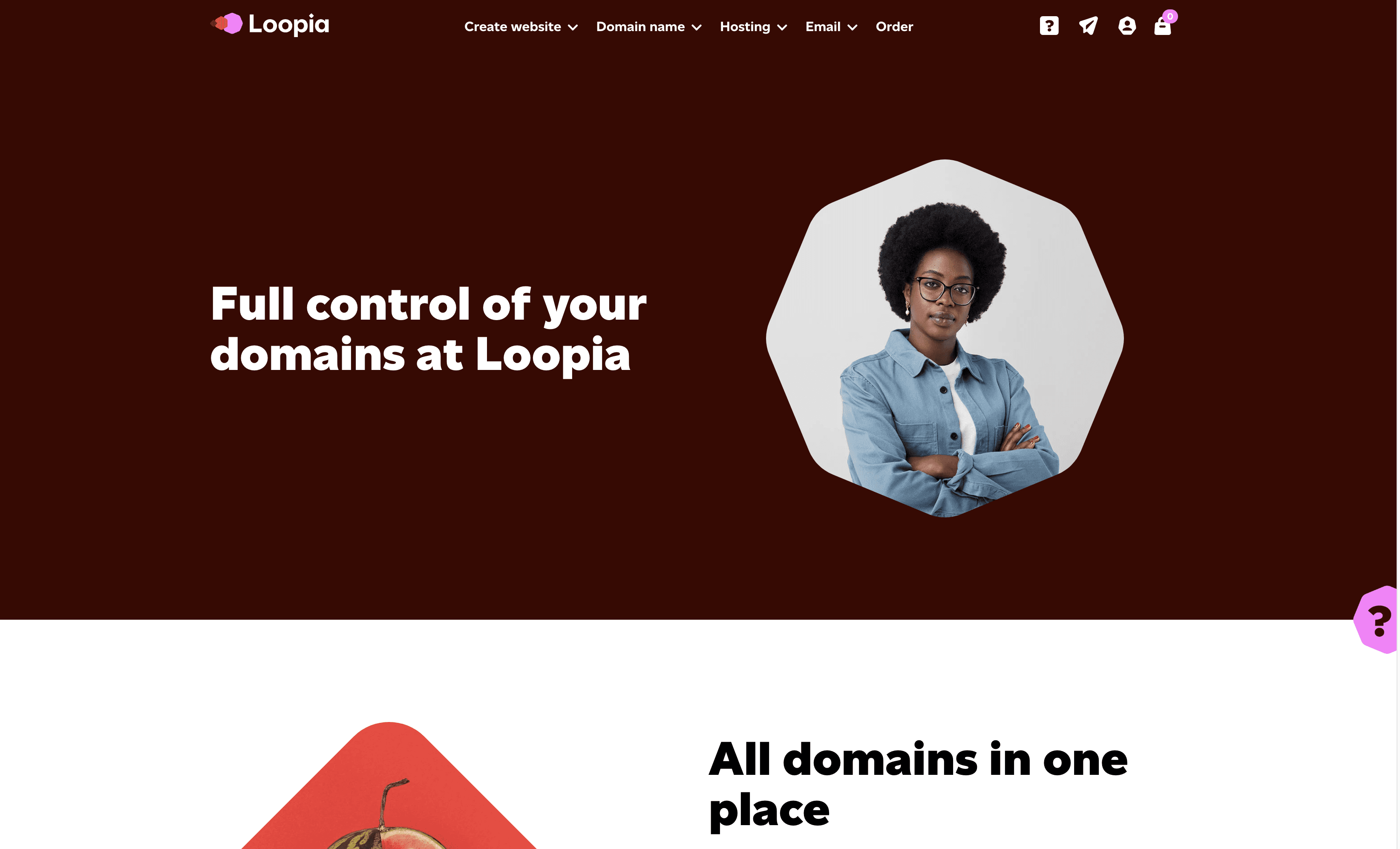
LoopiaDNS is a domain management service that offers comprehensive tools for managing domain names. It includes features like advanced DNS settings, dynamic DNS, and DNS backup. Designed for ease of use, LoopiaDNS aims to simplify domain administration for both individuals and businesses.
Loopia DNS Pricing
LoopiaDomain: 0 SEK/month
LoopiaDNS: 9 SEK/month excluding VAT, 11.25 SEK/month including VAT
Loopia DNS Reviews
Loopia DNS has an overall rating of 4.1 out of 5 stars based on 12 reviews. Users appreciate its ease of use and reliability but note issues with customer support. Check out more of our reviews here!
Pros and Cons of Loopia DNS
Pros:
Centralized Management: Manage all your domain names in one place, simplifying administration and reducing complexity.
Advanced DNS Settings: Configure CNAME, A, and MX records with ease, offering flexibility for various needs.
Dynamic DNS: Update DNS settings dynamically, ensuring your domain configurations are always up-to-date.
Cons:
Technical Support: Users report slow response times from tech support, which can delay issue resolution.
Server Downtime: Servers may experience downtime at the start of the month due to billing load, affecting reliability.
Customer Support: Some users find customer support lacking, with issues taking longer to resolve than expected.
4. WebTitan Web Security
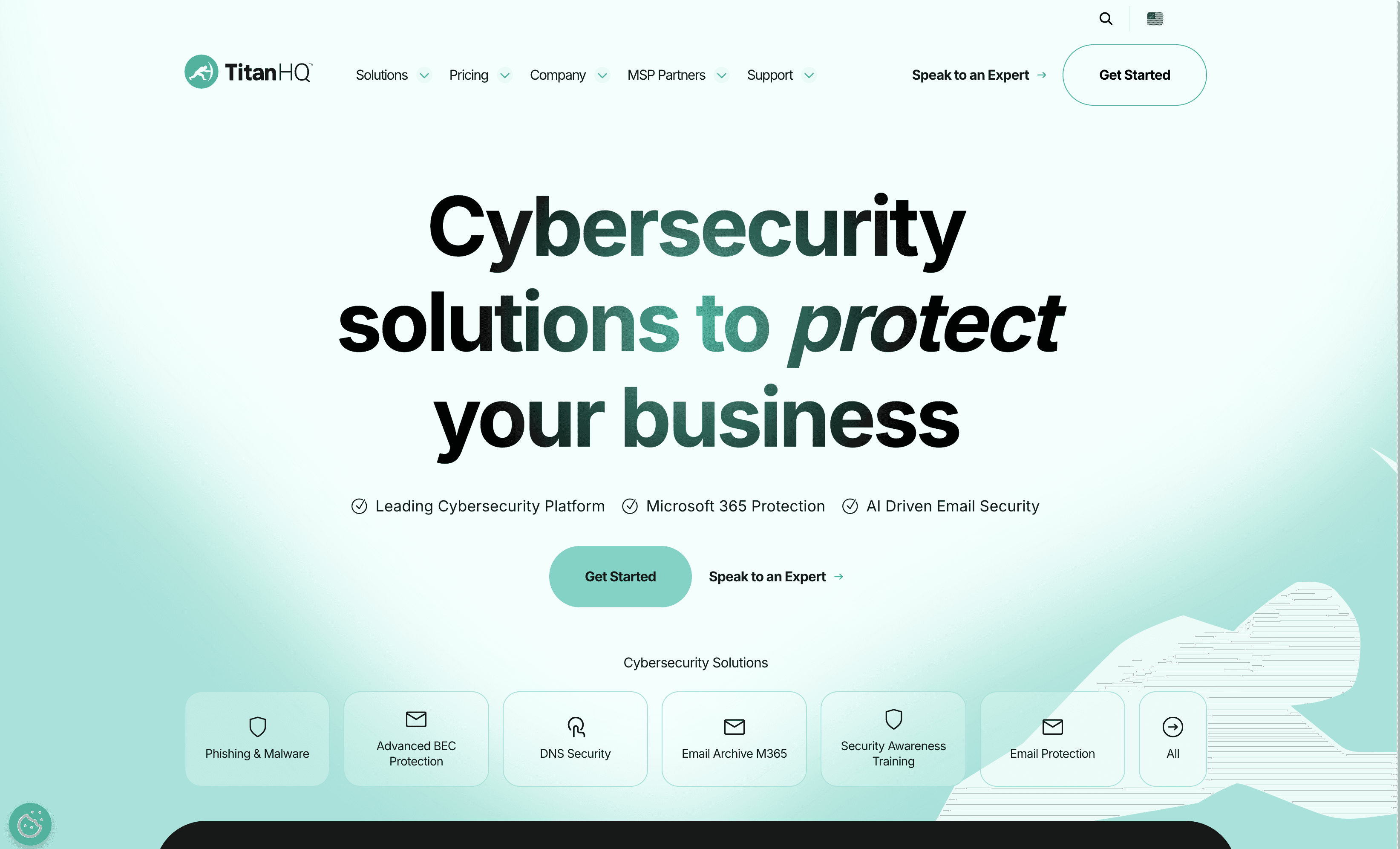
WebTitan is a web security solution designed to provide advanced DNS filtering and AI-driven threat protection. It offers robust web content controls and seamless integration with existing systems, making it an ideal choice for businesses looking to enhance their cybersecurity measures without compromising on ease of use.
WebTitan Web Security Pricing
WebTitan Web Security's pricing is not public. Contact their support for more info.
WebTitan Web Security Reviews
WebTitan Web Security has an overall rating of 4.3 out of 5 stars based on 85 reviews. Users appreciate its ease of setup and effective DNS protection. Check out more of our reviews here!
Pros and Cons of WebTitan Web Security
Pros:
AI-Driven Threat Protection: Utilizes AI to identify and block online threats like phishing and malware, ensuring robust security.
Advanced Web Content Controls: Offers comprehensive content filtering to block malicious content at the source, enhancing safety.
Cost-Effective: More economical compared to competitors, providing high-level security without breaking the bank.
Cons:
False Positives: Some legitimate websites may be mistakenly blocked, causing inconvenience to users.
Storage Issues: If not restarted periodically, storage can fill up, preventing access to the web interface.
Limited Device Support: The OTG client does not yet support smartphones (Android and iOS) and Linux devices.
5. Azure DNS
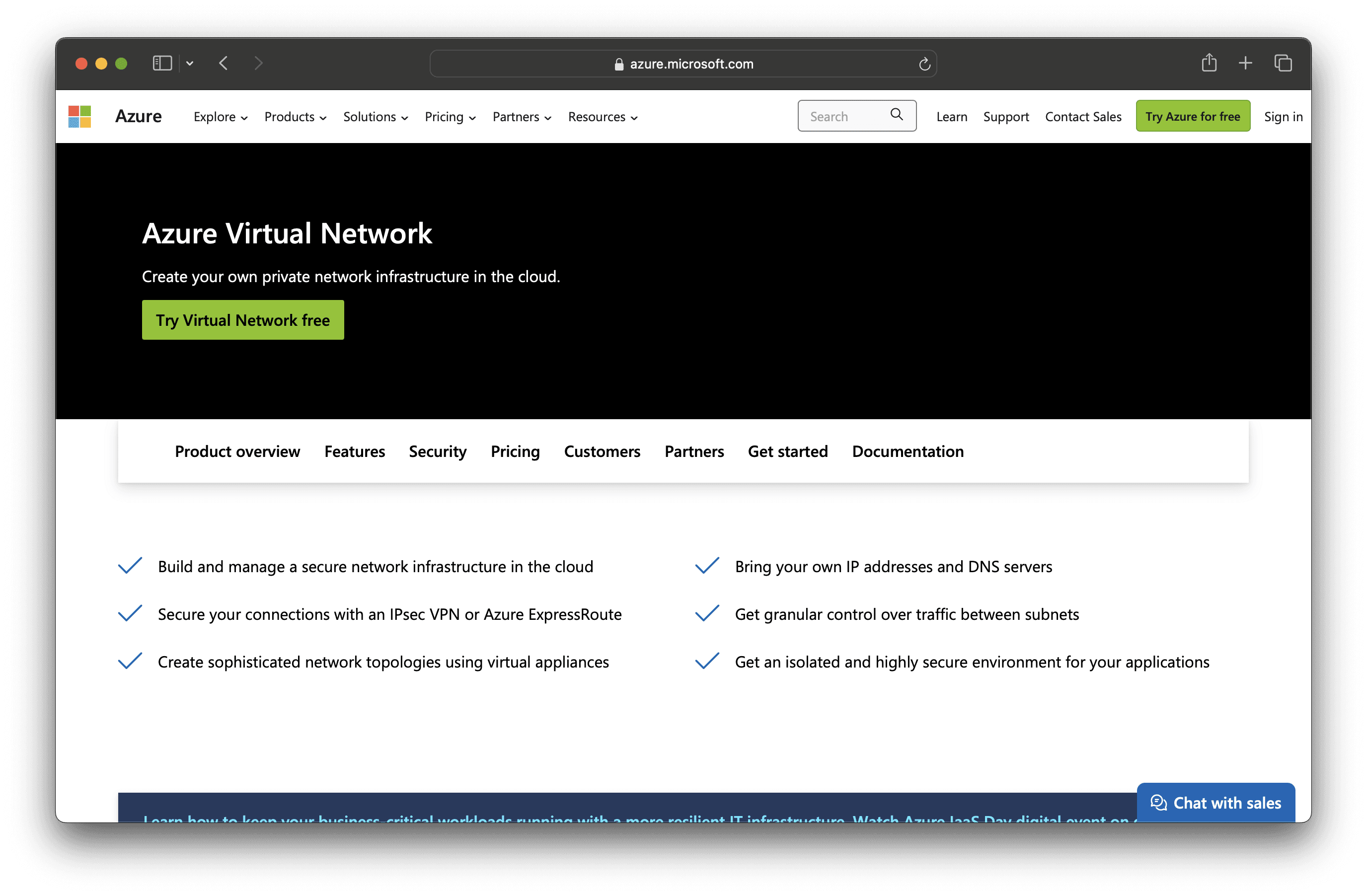
Azure DNS is a cloud-based service that allows users to host their DNS domains on Microsoft Azure. It integrates seamlessly with other Azure services, providing a streamlined and efficient way to manage DNS records. With high availability and fast DNS query responses, Azure DNS ensures reliable and quick updates to DNS records.
Azure DNS Pricing
No upfront cost
No termination fees
Pay for only what you use
Azure DNS Reviews
Azure DNS has an overall rating of 4.4 out of 5 stars based on 23 reviews. Users appreciate its reliability and integration with other Azure services. Check out more of our reviews here!
Pros and Cons of Azure DNS
Pros:
Seamless Integration: Azure DNS integrates effortlessly with other Azure services, simplifying DNS management and deployment.
High Availability: Leveraging Microsoft's global network ensures ultra-high availability and reliability for DNS queries.
Fast Performance: Anycast networking routes DNS queries to the nearest server, optimizing response times.
Cons:
Complex Interface: The user interface can be challenging for newcomers, requiring a learning curve.
Costly: The pay-as-you-go model may result in higher costs depending on usage patterns.
Azure Dependency: Full benefits are realized only within the Azure ecosystem, limiting flexibility.
6. ESET Parental Control
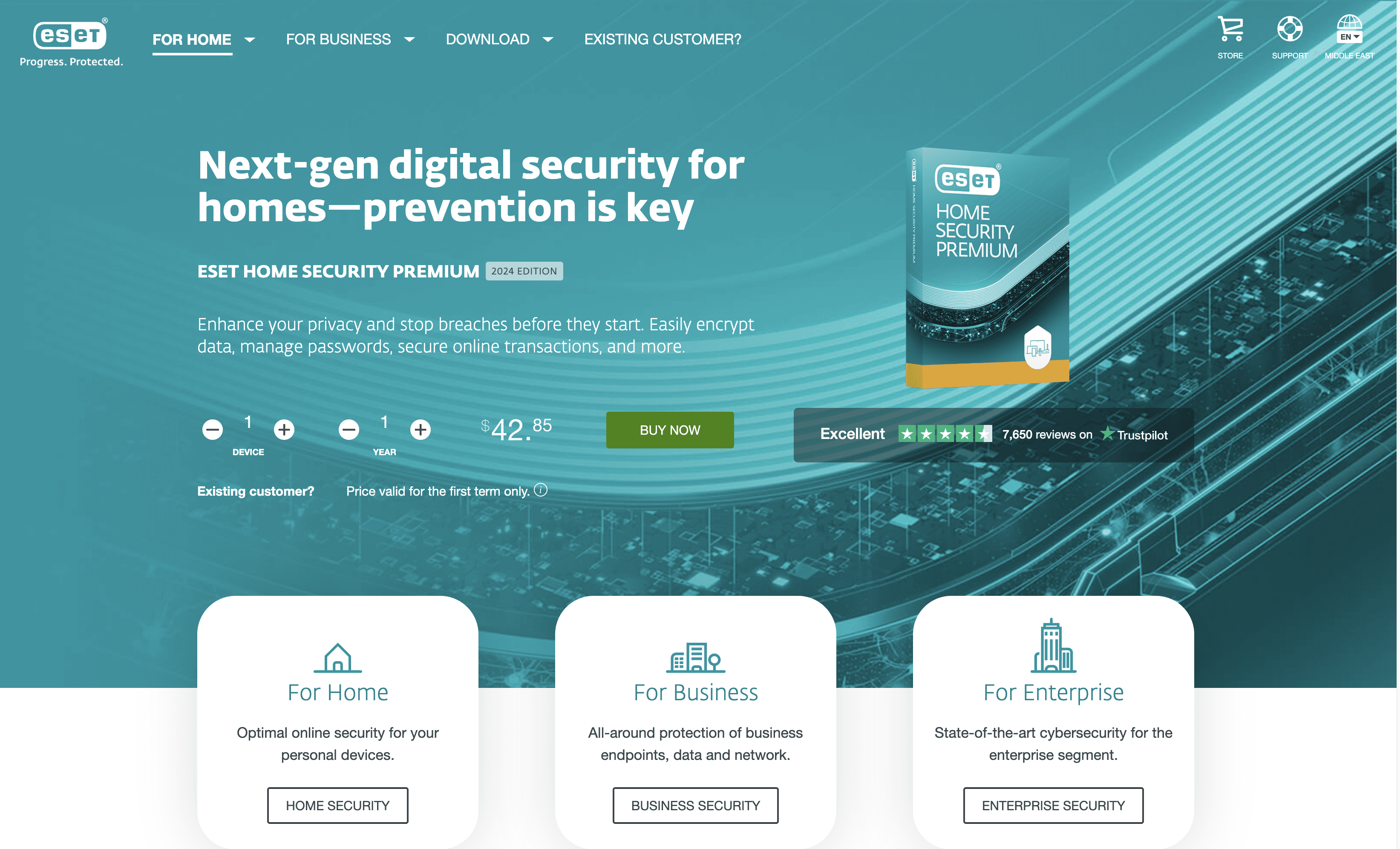
ESET Parental Control is a comprehensive solution designed to help parents manage and monitor their children's online activities. It offers features like app blocking, web filtering, and location tracking, ensuring a safe and controlled digital environment for kids. Easy to set up and use, it provides peace of mind for families.
ESET Parental Control Pricing
Essential Plan: $29.95 per year
Premium Plan: $44.95 per year
Ultimate Plan: $89.95 per year
ESET Parental Control Reviews
ESET Parental Control has an overall rating of 4.3 out of 5 stars based on 10 reviews. Users appreciate its ease of use and effective malware protection. Check out more of our reviews here!
Pros and Cons of ESET Parental Control
Pros:
Reliable protection with long-term proven results, ensuring your child's online safety without compromising device performance.
Doesn't slow down devices, allowing for smooth and uninterrupted use while maintaining robust security measures.
Operates without annoying pop-up windows, providing a seamless and user-friendly experience for both parents and children.
Cons:
Initial setup can be complex, requiring some technical knowledge or additional support to configure properly.
Can be expensive, especially for families needing coverage for multiple devices or opting for premium plans.
Learning curve for new users, which may necessitate time and effort to fully understand and utilize all features effectively.
7. Gcore DNS
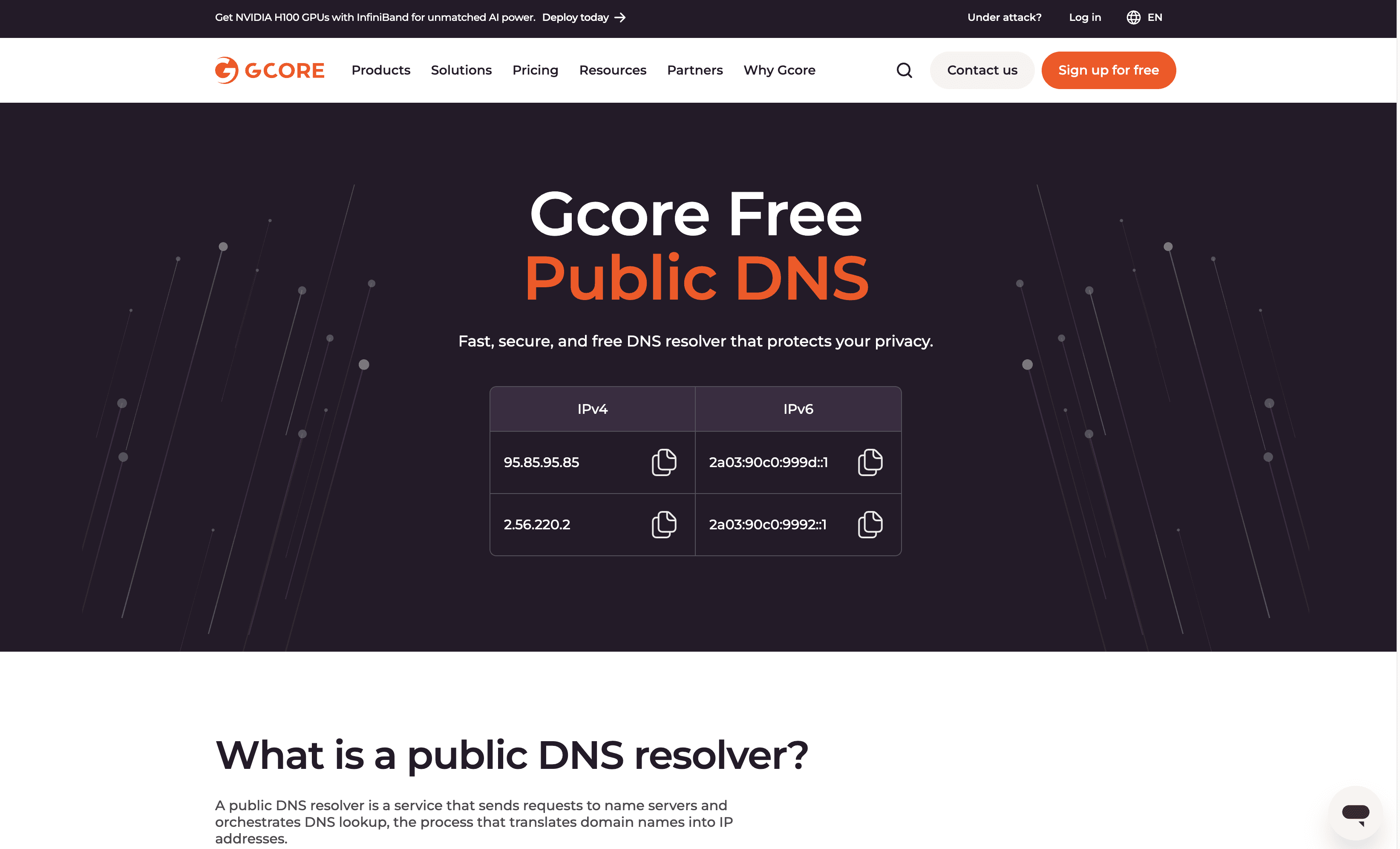
Gcore DNS is a fast and secure public DNS service designed to enhance online privacy and performance. It offers robust protection against DDoS attacks and ensures user data privacy by anonymizing query logs. Easy to set up, Gcore DNS is ideal for anyone seeking a reliable DNS solution.
Gcore DNS Pricing
Gcore DNS's pricing is not public. Contact their support for more info.
Gcore DNS Reviews
Gcore DNS has an overall rating of 4.3 out of 5 stars based on 13 reviews. Users appreciate its global network and low latency. Check out more of our reviews here!
Pros and Cons of Gcore DNS
Pros:
Speed: Gcore DNS is one of the fastest DNS services in Europe, South America, and Africa, ensuring quick query responses.
Global Edge Network: Operates over a global edge network with 180+ PoPs, providing a superior browsing experience worldwide.
Privacy: Anonymizes DNS query logs and stores them securely in a Luxembourg Tier IV data center, ensuring user privacy under EU law.
Cons:
Query Speed: While fast, Gcore's query speed (13.22 ms) is slightly slower compared to some competitors like 1.1.1.1 (9.75 ms).
Limited Advanced Features: The service lacks detailed information on advanced features or customization options, which may limit its appeal to power users.
Cost: Some users find the service expensive, especially when compared to other DNS solutions offering similar features.
8. Webroot
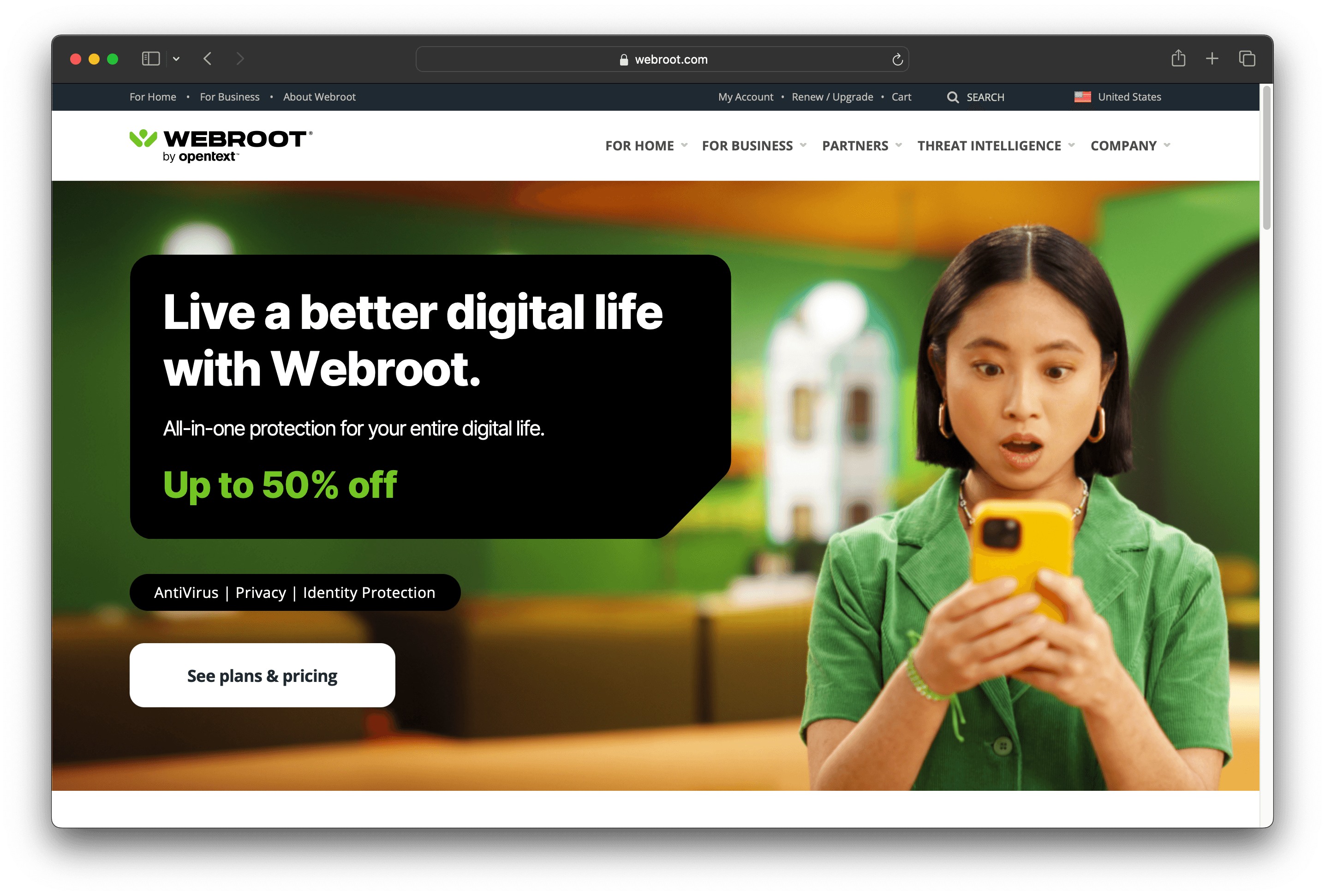
Webroot is a cloud-based DNS protection service designed to secure DNS connections against cyberattacks. It offers features like detailed on-demand reports, policy enforcement, and threat blocking at the domain level. Easy to set up and integrate, Webroot aims to provide robust security for businesses of all sizes.
Webroot Pricing
Business Endpoint Protection: 5 Seats: $150.00, 25 Seats: $690.00, 50+ Seats: Request a quote
DNS Protection: 5 Seats: $150.00, 25 Seats: $690.00, 50+ Seats: Request a quote
Security Awareness Training: 5 Seats: $150.00, 25 Seats: $690.00, 50+ Seats: Request a quote
Webroot Reviews
Webroot has an overall rating of 4.4 out of 5 stars based on 86 reviews. Users appreciate its ease of use and effective DNS protection. Check out more of our reviews here!
Pros and Cons of Webroot
Pros:
Cloud-Based Service: No hardware or software installations needed, making setup quick and easy.
Detailed Reporting: Provides comprehensive reports on threats and web usage, enhancing visibility.
Policy Enforcement: Allows granular control over internet usage by group, device, or IP.
Cons:
Higher Cost: More expensive compared to competitors like Cisco Umbrella, impacting budget-conscious users.
Configuration Complexity: Initial setup can be complicated, requiring technical knowledge or support.
Random Instability: Occasional instability may cause endpoints to lose internet access, affecting reliability.
9. F5 BIG-IP DNS
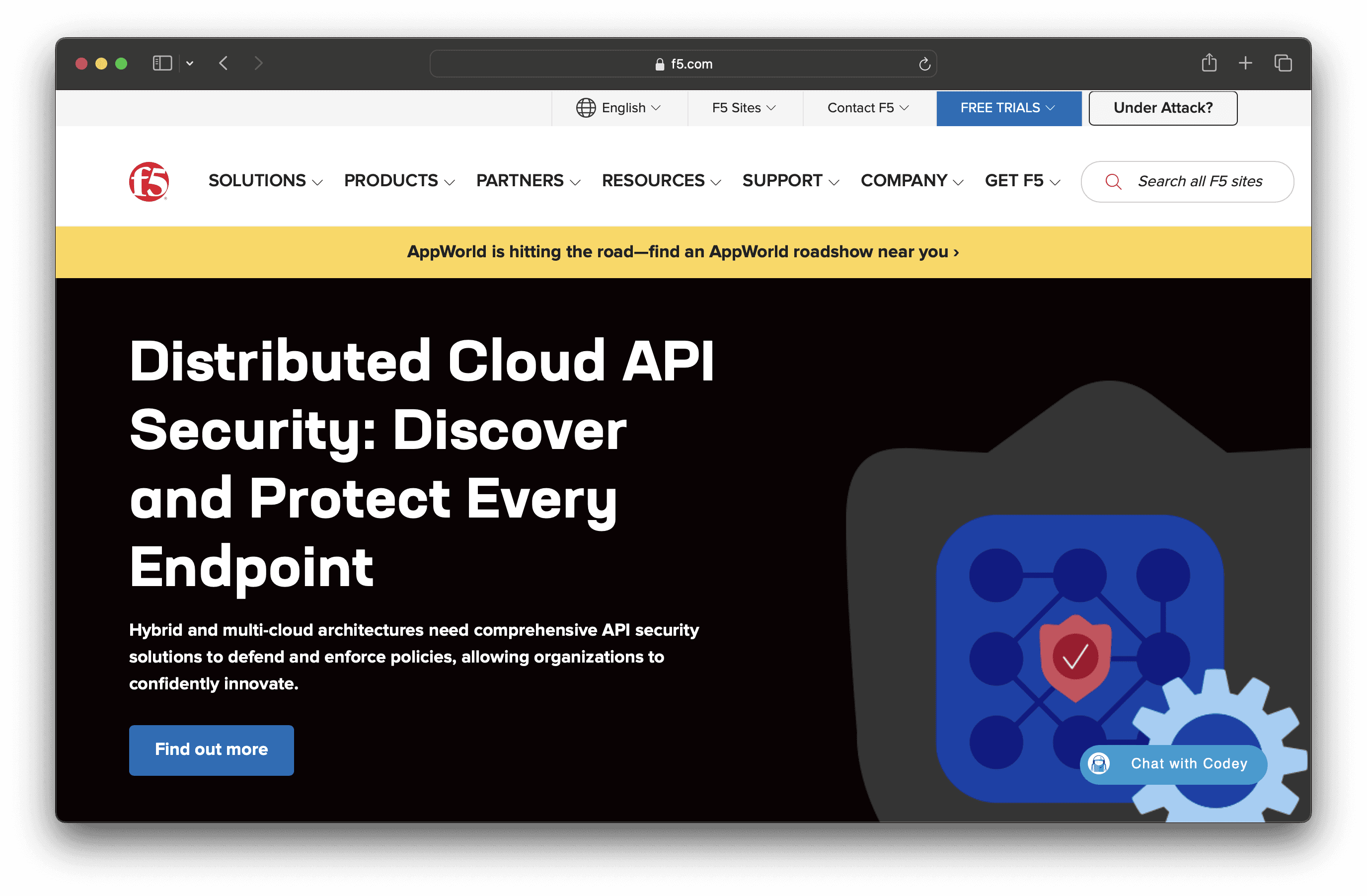
F5 BIG-IP DNS is designed to hyperscale and secure DNS infrastructure, ensuring high availability and performance even during high query volumes and DDoS attacks. It offers unmatched DNS performance, on-demand scaling, and secure DNS features, making it ideal for businesses seeking robust and reliable DNS solutions.
F5 BIG-IP DNS Pricing
F5 BIG-IP DNS's pricing is not public. Contact their support for more info.
F5 BIG-IP DNS Reviews
F5 BIG-IP DNS has an overall rating of 4.2 out of 5 stars based on 11 reviews. Users appreciate its seamless integration and reliability. Check out more of our reviews here!
Pros and Cons of F5 BIG-IP DNS
Pros:
High Performance: Hyperscales up to 100 million responses per second, ensuring rapid query handling.
On-Demand Scaling: Adjusts capacity dynamically, accommodating fluctuating traffic seamlessly.
Global Performance: Directs users to the fastest, most reliable connection based on real-time data.
Cons:
Complexity: Extensive features require a steep learning curve and specialized knowledge to manage effectively.
Cost: High-performance and comprehensive security features come at a significant cost, impacting smaller organizations.
Integration Requirements: Ensuring compatibility with existing infrastructure may require additional effort and resources.
10. WebTitan
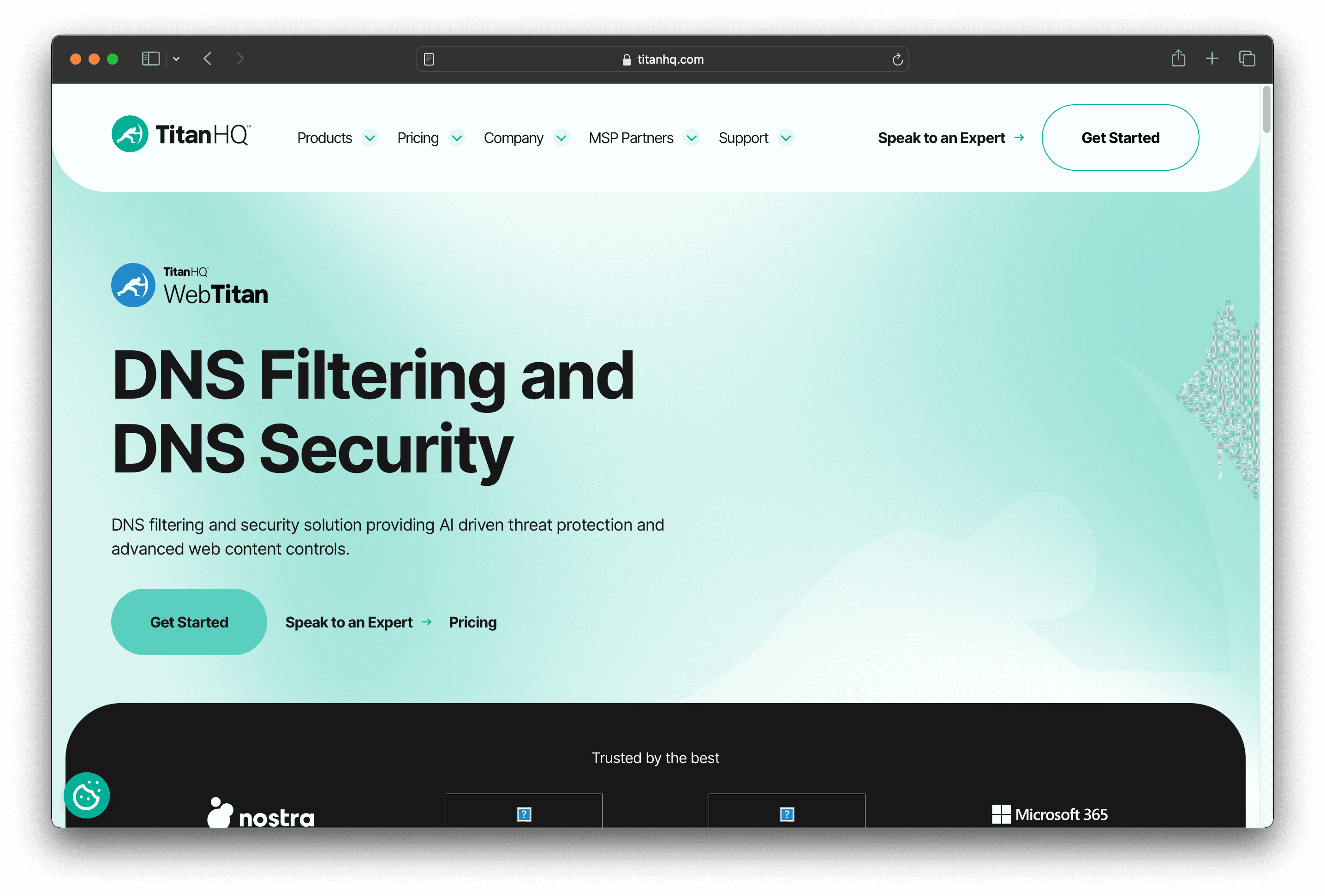
WebTitan is a web security solution offering advanced DNS filtering and AI-driven threat protection. It provides robust web content controls and seamless integration with existing systems, making it an ideal choice for businesses looking to enhance their cybersecurity measures without compromising on ease of use.
WebTitan Pricing
Phishing Protection: Contact sales for custom quotes.
Email Anti-Spam Solution: Contact sales for custom quotes.
DNS Filtering: Contact sales for custom quotes.
Security Awareness: Contact sales for custom quotes.
Email Archiving: Contact sales for custom quotes.
Email Encryption: Contact sales for custom quotes.
Bundles: Standard, Plus, Pro
WebTitan Reviews
WebTitan has an overall rating of 4.3 out of 5 stars based on 85 reviews. Users appreciate its ease of use and effective DNS protection. Check out more of our reviews here!
Pros and Cons of WebTitan
Pros:
Real-Time Threat Protection: AI-driven technology identifies and blocks threats instantly, ensuring robust security.
Scalable and Fast: Handles high volumes of traffic without latency, making it suitable for businesses of all sizes.
Comprehensive Features: Offers URL filtering, flexible policies, and real-time reporting, providing a complete security solution.
Cons:
False Positives: Some legitimate websites may be mistakenly blocked, causing inconvenience to users.
Storage Issues: If not restarted periodically, storage can fill up, preventing access to the web interface.
Limited Device Support: The OTG client does not yet support smartphones (Android and iOS) and Linux devices.
Looking to secure your technical infrastructure?
Twingate offers granular access controls and deployment automations to protect your VPC environment. By leveraging Zero Trust security tools, Twingate ensures that private resources and internet traffic remain secure in the modern work landscape. Try Twingate for Free today!
Rapidly implement a modern Zero Trust network that is more secure and maintainable than VPNs.
The Best 10 Alternatives to CloudFloorDNS (+ Pricing & Reviews)
Twingate Team
•
Jul 27, 2024

CloudFloorDNS offers a range of DNS-related services, including Managed DNS, Secondary DNS, DNS Failover, GEO DNS, and Domain Registration. While their services are robust, they may not be suitable for everyone. This article explores the importance of secure access to private resources for distributed workforces.

10 Alternatives to CloudFloorDNS
1. Twingate

Twingate is a network security solution designed to replace traditional VPNs for remote access, offering a zero-trust security model and seamless deployment alongside existing infrastructure. With a focus on ease of use and scalability, Twingate aims to provide a secure and maintainable solution for businesses of all sizes.
Twingate Pricing
Starter: Free per user/month
Teams: $6 per user/month (monthly), $5 per user/month (yearly)
Business: $12 per user/month (monthly), $10 per user/month (yearly)
Enterprise: Custom pricing per user/month
Twingate Reviews
Twingate has an overall rating of 4.7 out of 5 stars based on 63 reviews. Users praise its ease of setup and high security. Check out more of our reviews here!
Pros and Cons of Twingate
Pros:
Seamless integration with existing infrastructure, making it easy to deploy without disrupting current systems.
Zero trust security model ensures that only authenticated users can access private resources, enhancing overall security.
High user satisfaction with ease of setup and use, reducing the learning curve for new users.
Cons:
Some users report occasional performance issues, which can affect the reliability of remote access.
Limited customization options may not meet the specific needs of all organizations.
Logging issues have been noted, potentially complicating the monitoring and auditing of access activities.
2. NextDNS

NextDNS is a modern DNS service designed to enhance online privacy and security. It offers customizable filtering, analytics, and protection against malicious sites. With a focus on ease of use and comprehensive features, NextDNS aims to provide a secure browsing experience for individuals and organizations alike.
NextDNS Pricing
Free Plan: $0/month
Pro Plan: $1.99/month or $19.90/year
Business Plan: $19.90/month* or $199/year* (* for every 50 employees)
Education Plan: $19.90/month* or $199/year* (* for every 250 students)
NextDNS Reviews
NextDNS has an overall rating of 4.7 out of 5 stars based on 3 reviews. Users appreciate its ad blocking and privacy features. Check out more of our reviews here!
Pros and Cons ofNextDNS
Pros:
Effective Ad Blocking: Blocks ads in Apple News and other desktop apps, enhancing user experience by reducing unwanted content.
Privacy: Keeps DNS queries private, ensuring that user browsing data remains confidential and secure from third-party tracking.
Ease of Setup: Provides easy instructions for setting up DNS on multiple platforms, making it accessible even for non-technical users.
Cons:
Initial Setup: Can be confusing to set up the first time, potentially requiring additional support or guidance for new users.
Compatibility Issues: Some websites or services may not work correctly when routing DNS queries through NextDNS, affecting usability.
Incomplete Ad Blocking: Some ads and tracking are not filtered or blocked, which may not meet all user expectations for ad-free browsing.
3. Loopia DNS

LoopiaDNS is a domain management service that offers comprehensive tools for managing domain names. It includes features like advanced DNS settings, dynamic DNS, and DNS backup. Designed for ease of use, LoopiaDNS aims to simplify domain administration for both individuals and businesses.
Loopia DNS Pricing
LoopiaDomain: 0 SEK/month
LoopiaDNS: 9 SEK/month excluding VAT, 11.25 SEK/month including VAT
Loopia DNS Reviews
Loopia DNS has an overall rating of 4.1 out of 5 stars based on 12 reviews. Users appreciate its ease of use and reliability but note issues with customer support. Check out more of our reviews here!
Pros and Cons of Loopia DNS
Pros:
Centralized Management: Manage all your domain names in one place, simplifying administration and reducing complexity.
Advanced DNS Settings: Configure CNAME, A, and MX records with ease, offering flexibility for various needs.
Dynamic DNS: Update DNS settings dynamically, ensuring your domain configurations are always up-to-date.
Cons:
Technical Support: Users report slow response times from tech support, which can delay issue resolution.
Server Downtime: Servers may experience downtime at the start of the month due to billing load, affecting reliability.
Customer Support: Some users find customer support lacking, with issues taking longer to resolve than expected.
4. WebTitan Web Security

WebTitan is a web security solution designed to provide advanced DNS filtering and AI-driven threat protection. It offers robust web content controls and seamless integration with existing systems, making it an ideal choice for businesses looking to enhance their cybersecurity measures without compromising on ease of use.
WebTitan Web Security Pricing
WebTitan Web Security's pricing is not public. Contact their support for more info.
WebTitan Web Security Reviews
WebTitan Web Security has an overall rating of 4.3 out of 5 stars based on 85 reviews. Users appreciate its ease of setup and effective DNS protection. Check out more of our reviews here!
Pros and Cons of WebTitan Web Security
Pros:
AI-Driven Threat Protection: Utilizes AI to identify and block online threats like phishing and malware, ensuring robust security.
Advanced Web Content Controls: Offers comprehensive content filtering to block malicious content at the source, enhancing safety.
Cost-Effective: More economical compared to competitors, providing high-level security without breaking the bank.
Cons:
False Positives: Some legitimate websites may be mistakenly blocked, causing inconvenience to users.
Storage Issues: If not restarted periodically, storage can fill up, preventing access to the web interface.
Limited Device Support: The OTG client does not yet support smartphones (Android and iOS) and Linux devices.
5. Azure DNS

Azure DNS is a cloud-based service that allows users to host their DNS domains on Microsoft Azure. It integrates seamlessly with other Azure services, providing a streamlined and efficient way to manage DNS records. With high availability and fast DNS query responses, Azure DNS ensures reliable and quick updates to DNS records.
Azure DNS Pricing
No upfront cost
No termination fees
Pay for only what you use
Azure DNS Reviews
Azure DNS has an overall rating of 4.4 out of 5 stars based on 23 reviews. Users appreciate its reliability and integration with other Azure services. Check out more of our reviews here!
Pros and Cons of Azure DNS
Pros:
Seamless Integration: Azure DNS integrates effortlessly with other Azure services, simplifying DNS management and deployment.
High Availability: Leveraging Microsoft's global network ensures ultra-high availability and reliability for DNS queries.
Fast Performance: Anycast networking routes DNS queries to the nearest server, optimizing response times.
Cons:
Complex Interface: The user interface can be challenging for newcomers, requiring a learning curve.
Costly: The pay-as-you-go model may result in higher costs depending on usage patterns.
Azure Dependency: Full benefits are realized only within the Azure ecosystem, limiting flexibility.
6. ESET Parental Control

ESET Parental Control is a comprehensive solution designed to help parents manage and monitor their children's online activities. It offers features like app blocking, web filtering, and location tracking, ensuring a safe and controlled digital environment for kids. Easy to set up and use, it provides peace of mind for families.
ESET Parental Control Pricing
Essential Plan: $29.95 per year
Premium Plan: $44.95 per year
Ultimate Plan: $89.95 per year
ESET Parental Control Reviews
ESET Parental Control has an overall rating of 4.3 out of 5 stars based on 10 reviews. Users appreciate its ease of use and effective malware protection. Check out more of our reviews here!
Pros and Cons of ESET Parental Control
Pros:
Reliable protection with long-term proven results, ensuring your child's online safety without compromising device performance.
Doesn't slow down devices, allowing for smooth and uninterrupted use while maintaining robust security measures.
Operates without annoying pop-up windows, providing a seamless and user-friendly experience for both parents and children.
Cons:
Initial setup can be complex, requiring some technical knowledge or additional support to configure properly.
Can be expensive, especially for families needing coverage for multiple devices or opting for premium plans.
Learning curve for new users, which may necessitate time and effort to fully understand and utilize all features effectively.
7. Gcore DNS

Gcore DNS is a fast and secure public DNS service designed to enhance online privacy and performance. It offers robust protection against DDoS attacks and ensures user data privacy by anonymizing query logs. Easy to set up, Gcore DNS is ideal for anyone seeking a reliable DNS solution.
Gcore DNS Pricing
Gcore DNS's pricing is not public. Contact their support for more info.
Gcore DNS Reviews
Gcore DNS has an overall rating of 4.3 out of 5 stars based on 13 reviews. Users appreciate its global network and low latency. Check out more of our reviews here!
Pros and Cons of Gcore DNS
Pros:
Speed: Gcore DNS is one of the fastest DNS services in Europe, South America, and Africa, ensuring quick query responses.
Global Edge Network: Operates over a global edge network with 180+ PoPs, providing a superior browsing experience worldwide.
Privacy: Anonymizes DNS query logs and stores them securely in a Luxembourg Tier IV data center, ensuring user privacy under EU law.
Cons:
Query Speed: While fast, Gcore's query speed (13.22 ms) is slightly slower compared to some competitors like 1.1.1.1 (9.75 ms).
Limited Advanced Features: The service lacks detailed information on advanced features or customization options, which may limit its appeal to power users.
Cost: Some users find the service expensive, especially when compared to other DNS solutions offering similar features.
8. Webroot

Webroot is a cloud-based DNS protection service designed to secure DNS connections against cyberattacks. It offers features like detailed on-demand reports, policy enforcement, and threat blocking at the domain level. Easy to set up and integrate, Webroot aims to provide robust security for businesses of all sizes.
Webroot Pricing
Business Endpoint Protection: 5 Seats: $150.00, 25 Seats: $690.00, 50+ Seats: Request a quote
DNS Protection: 5 Seats: $150.00, 25 Seats: $690.00, 50+ Seats: Request a quote
Security Awareness Training: 5 Seats: $150.00, 25 Seats: $690.00, 50+ Seats: Request a quote
Webroot Reviews
Webroot has an overall rating of 4.4 out of 5 stars based on 86 reviews. Users appreciate its ease of use and effective DNS protection. Check out more of our reviews here!
Pros and Cons of Webroot
Pros:
Cloud-Based Service: No hardware or software installations needed, making setup quick and easy.
Detailed Reporting: Provides comprehensive reports on threats and web usage, enhancing visibility.
Policy Enforcement: Allows granular control over internet usage by group, device, or IP.
Cons:
Higher Cost: More expensive compared to competitors like Cisco Umbrella, impacting budget-conscious users.
Configuration Complexity: Initial setup can be complicated, requiring technical knowledge or support.
Random Instability: Occasional instability may cause endpoints to lose internet access, affecting reliability.
9. F5 BIG-IP DNS

F5 BIG-IP DNS is designed to hyperscale and secure DNS infrastructure, ensuring high availability and performance even during high query volumes and DDoS attacks. It offers unmatched DNS performance, on-demand scaling, and secure DNS features, making it ideal for businesses seeking robust and reliable DNS solutions.
F5 BIG-IP DNS Pricing
F5 BIG-IP DNS's pricing is not public. Contact their support for more info.
F5 BIG-IP DNS Reviews
F5 BIG-IP DNS has an overall rating of 4.2 out of 5 stars based on 11 reviews. Users appreciate its seamless integration and reliability. Check out more of our reviews here!
Pros and Cons of F5 BIG-IP DNS
Pros:
High Performance: Hyperscales up to 100 million responses per second, ensuring rapid query handling.
On-Demand Scaling: Adjusts capacity dynamically, accommodating fluctuating traffic seamlessly.
Global Performance: Directs users to the fastest, most reliable connection based on real-time data.
Cons:
Complexity: Extensive features require a steep learning curve and specialized knowledge to manage effectively.
Cost: High-performance and comprehensive security features come at a significant cost, impacting smaller organizations.
Integration Requirements: Ensuring compatibility with existing infrastructure may require additional effort and resources.
10. WebTitan

WebTitan is a web security solution offering advanced DNS filtering and AI-driven threat protection. It provides robust web content controls and seamless integration with existing systems, making it an ideal choice for businesses looking to enhance their cybersecurity measures without compromising on ease of use.
WebTitan Pricing
Phishing Protection: Contact sales for custom quotes.
Email Anti-Spam Solution: Contact sales for custom quotes.
DNS Filtering: Contact sales for custom quotes.
Security Awareness: Contact sales for custom quotes.
Email Archiving: Contact sales for custom quotes.
Email Encryption: Contact sales for custom quotes.
Bundles: Standard, Plus, Pro
WebTitan Reviews
WebTitan has an overall rating of 4.3 out of 5 stars based on 85 reviews. Users appreciate its ease of use and effective DNS protection. Check out more of our reviews here!
Pros and Cons of WebTitan
Pros:
Real-Time Threat Protection: AI-driven technology identifies and blocks threats instantly, ensuring robust security.
Scalable and Fast: Handles high volumes of traffic without latency, making it suitable for businesses of all sizes.
Comprehensive Features: Offers URL filtering, flexible policies, and real-time reporting, providing a complete security solution.
Cons:
False Positives: Some legitimate websites may be mistakenly blocked, causing inconvenience to users.
Storage Issues: If not restarted periodically, storage can fill up, preventing access to the web interface.
Limited Device Support: The OTG client does not yet support smartphones (Android and iOS) and Linux devices.
Looking to secure your technical infrastructure?
Twingate offers granular access controls and deployment automations to protect your VPC environment. By leveraging Zero Trust security tools, Twingate ensures that private resources and internet traffic remain secure in the modern work landscape. Try Twingate for Free today!
Rapidly implement a modern Zero Trust network that is more secure and maintainable than VPNs.
The Best 10 Alternatives to CloudFloorDNS (+ Pricing & Reviews)
Twingate Team
•
Jul 27, 2024

CloudFloorDNS offers a range of DNS-related services, including Managed DNS, Secondary DNS, DNS Failover, GEO DNS, and Domain Registration. While their services are robust, they may not be suitable for everyone. This article explores the importance of secure access to private resources for distributed workforces.

10 Alternatives to CloudFloorDNS
1. Twingate

Twingate is a network security solution designed to replace traditional VPNs for remote access, offering a zero-trust security model and seamless deployment alongside existing infrastructure. With a focus on ease of use and scalability, Twingate aims to provide a secure and maintainable solution for businesses of all sizes.
Twingate Pricing
Starter: Free per user/month
Teams: $6 per user/month (monthly), $5 per user/month (yearly)
Business: $12 per user/month (monthly), $10 per user/month (yearly)
Enterprise: Custom pricing per user/month
Twingate Reviews
Twingate has an overall rating of 4.7 out of 5 stars based on 63 reviews. Users praise its ease of setup and high security. Check out more of our reviews here!
Pros and Cons of Twingate
Pros:
Seamless integration with existing infrastructure, making it easy to deploy without disrupting current systems.
Zero trust security model ensures that only authenticated users can access private resources, enhancing overall security.
High user satisfaction with ease of setup and use, reducing the learning curve for new users.
Cons:
Some users report occasional performance issues, which can affect the reliability of remote access.
Limited customization options may not meet the specific needs of all organizations.
Logging issues have been noted, potentially complicating the monitoring and auditing of access activities.
2. NextDNS

NextDNS is a modern DNS service designed to enhance online privacy and security. It offers customizable filtering, analytics, and protection against malicious sites. With a focus on ease of use and comprehensive features, NextDNS aims to provide a secure browsing experience for individuals and organizations alike.
NextDNS Pricing
Free Plan: $0/month
Pro Plan: $1.99/month or $19.90/year
Business Plan: $19.90/month* or $199/year* (* for every 50 employees)
Education Plan: $19.90/month* or $199/year* (* for every 250 students)
NextDNS Reviews
NextDNS has an overall rating of 4.7 out of 5 stars based on 3 reviews. Users appreciate its ad blocking and privacy features. Check out more of our reviews here!
Pros and Cons ofNextDNS
Pros:
Effective Ad Blocking: Blocks ads in Apple News and other desktop apps, enhancing user experience by reducing unwanted content.
Privacy: Keeps DNS queries private, ensuring that user browsing data remains confidential and secure from third-party tracking.
Ease of Setup: Provides easy instructions for setting up DNS on multiple platforms, making it accessible even for non-technical users.
Cons:
Initial Setup: Can be confusing to set up the first time, potentially requiring additional support or guidance for new users.
Compatibility Issues: Some websites or services may not work correctly when routing DNS queries through NextDNS, affecting usability.
Incomplete Ad Blocking: Some ads and tracking are not filtered or blocked, which may not meet all user expectations for ad-free browsing.
3. Loopia DNS

LoopiaDNS is a domain management service that offers comprehensive tools for managing domain names. It includes features like advanced DNS settings, dynamic DNS, and DNS backup. Designed for ease of use, LoopiaDNS aims to simplify domain administration for both individuals and businesses.
Loopia DNS Pricing
LoopiaDomain: 0 SEK/month
LoopiaDNS: 9 SEK/month excluding VAT, 11.25 SEK/month including VAT
Loopia DNS Reviews
Loopia DNS has an overall rating of 4.1 out of 5 stars based on 12 reviews. Users appreciate its ease of use and reliability but note issues with customer support. Check out more of our reviews here!
Pros and Cons of Loopia DNS
Pros:
Centralized Management: Manage all your domain names in one place, simplifying administration and reducing complexity.
Advanced DNS Settings: Configure CNAME, A, and MX records with ease, offering flexibility for various needs.
Dynamic DNS: Update DNS settings dynamically, ensuring your domain configurations are always up-to-date.
Cons:
Technical Support: Users report slow response times from tech support, which can delay issue resolution.
Server Downtime: Servers may experience downtime at the start of the month due to billing load, affecting reliability.
Customer Support: Some users find customer support lacking, with issues taking longer to resolve than expected.
4. WebTitan Web Security

WebTitan is a web security solution designed to provide advanced DNS filtering and AI-driven threat protection. It offers robust web content controls and seamless integration with existing systems, making it an ideal choice for businesses looking to enhance their cybersecurity measures without compromising on ease of use.
WebTitan Web Security Pricing
WebTitan Web Security's pricing is not public. Contact their support for more info.
WebTitan Web Security Reviews
WebTitan Web Security has an overall rating of 4.3 out of 5 stars based on 85 reviews. Users appreciate its ease of setup and effective DNS protection. Check out more of our reviews here!
Pros and Cons of WebTitan Web Security
Pros:
AI-Driven Threat Protection: Utilizes AI to identify and block online threats like phishing and malware, ensuring robust security.
Advanced Web Content Controls: Offers comprehensive content filtering to block malicious content at the source, enhancing safety.
Cost-Effective: More economical compared to competitors, providing high-level security without breaking the bank.
Cons:
False Positives: Some legitimate websites may be mistakenly blocked, causing inconvenience to users.
Storage Issues: If not restarted periodically, storage can fill up, preventing access to the web interface.
Limited Device Support: The OTG client does not yet support smartphones (Android and iOS) and Linux devices.
5. Azure DNS

Azure DNS is a cloud-based service that allows users to host their DNS domains on Microsoft Azure. It integrates seamlessly with other Azure services, providing a streamlined and efficient way to manage DNS records. With high availability and fast DNS query responses, Azure DNS ensures reliable and quick updates to DNS records.
Azure DNS Pricing
No upfront cost
No termination fees
Pay for only what you use
Azure DNS Reviews
Azure DNS has an overall rating of 4.4 out of 5 stars based on 23 reviews. Users appreciate its reliability and integration with other Azure services. Check out more of our reviews here!
Pros and Cons of Azure DNS
Pros:
Seamless Integration: Azure DNS integrates effortlessly with other Azure services, simplifying DNS management and deployment.
High Availability: Leveraging Microsoft's global network ensures ultra-high availability and reliability for DNS queries.
Fast Performance: Anycast networking routes DNS queries to the nearest server, optimizing response times.
Cons:
Complex Interface: The user interface can be challenging for newcomers, requiring a learning curve.
Costly: The pay-as-you-go model may result in higher costs depending on usage patterns.
Azure Dependency: Full benefits are realized only within the Azure ecosystem, limiting flexibility.
6. ESET Parental Control

ESET Parental Control is a comprehensive solution designed to help parents manage and monitor their children's online activities. It offers features like app blocking, web filtering, and location tracking, ensuring a safe and controlled digital environment for kids. Easy to set up and use, it provides peace of mind for families.
ESET Parental Control Pricing
Essential Plan: $29.95 per year
Premium Plan: $44.95 per year
Ultimate Plan: $89.95 per year
ESET Parental Control Reviews
ESET Parental Control has an overall rating of 4.3 out of 5 stars based on 10 reviews. Users appreciate its ease of use and effective malware protection. Check out more of our reviews here!
Pros and Cons of ESET Parental Control
Pros:
Reliable protection with long-term proven results, ensuring your child's online safety without compromising device performance.
Doesn't slow down devices, allowing for smooth and uninterrupted use while maintaining robust security measures.
Operates without annoying pop-up windows, providing a seamless and user-friendly experience for both parents and children.
Cons:
Initial setup can be complex, requiring some technical knowledge or additional support to configure properly.
Can be expensive, especially for families needing coverage for multiple devices or opting for premium plans.
Learning curve for new users, which may necessitate time and effort to fully understand and utilize all features effectively.
7. Gcore DNS

Gcore DNS is a fast and secure public DNS service designed to enhance online privacy and performance. It offers robust protection against DDoS attacks and ensures user data privacy by anonymizing query logs. Easy to set up, Gcore DNS is ideal for anyone seeking a reliable DNS solution.
Gcore DNS Pricing
Gcore DNS's pricing is not public. Contact their support for more info.
Gcore DNS Reviews
Gcore DNS has an overall rating of 4.3 out of 5 stars based on 13 reviews. Users appreciate its global network and low latency. Check out more of our reviews here!
Pros and Cons of Gcore DNS
Pros:
Speed: Gcore DNS is one of the fastest DNS services in Europe, South America, and Africa, ensuring quick query responses.
Global Edge Network: Operates over a global edge network with 180+ PoPs, providing a superior browsing experience worldwide.
Privacy: Anonymizes DNS query logs and stores them securely in a Luxembourg Tier IV data center, ensuring user privacy under EU law.
Cons:
Query Speed: While fast, Gcore's query speed (13.22 ms) is slightly slower compared to some competitors like 1.1.1.1 (9.75 ms).
Limited Advanced Features: The service lacks detailed information on advanced features or customization options, which may limit its appeal to power users.
Cost: Some users find the service expensive, especially when compared to other DNS solutions offering similar features.
8. Webroot

Webroot is a cloud-based DNS protection service designed to secure DNS connections against cyberattacks. It offers features like detailed on-demand reports, policy enforcement, and threat blocking at the domain level. Easy to set up and integrate, Webroot aims to provide robust security for businesses of all sizes.
Webroot Pricing
Business Endpoint Protection: 5 Seats: $150.00, 25 Seats: $690.00, 50+ Seats: Request a quote
DNS Protection: 5 Seats: $150.00, 25 Seats: $690.00, 50+ Seats: Request a quote
Security Awareness Training: 5 Seats: $150.00, 25 Seats: $690.00, 50+ Seats: Request a quote
Webroot Reviews
Webroot has an overall rating of 4.4 out of 5 stars based on 86 reviews. Users appreciate its ease of use and effective DNS protection. Check out more of our reviews here!
Pros and Cons of Webroot
Pros:
Cloud-Based Service: No hardware or software installations needed, making setup quick and easy.
Detailed Reporting: Provides comprehensive reports on threats and web usage, enhancing visibility.
Policy Enforcement: Allows granular control over internet usage by group, device, or IP.
Cons:
Higher Cost: More expensive compared to competitors like Cisco Umbrella, impacting budget-conscious users.
Configuration Complexity: Initial setup can be complicated, requiring technical knowledge or support.
Random Instability: Occasional instability may cause endpoints to lose internet access, affecting reliability.
9. F5 BIG-IP DNS

F5 BIG-IP DNS is designed to hyperscale and secure DNS infrastructure, ensuring high availability and performance even during high query volumes and DDoS attacks. It offers unmatched DNS performance, on-demand scaling, and secure DNS features, making it ideal for businesses seeking robust and reliable DNS solutions.
F5 BIG-IP DNS Pricing
F5 BIG-IP DNS's pricing is not public. Contact their support for more info.
F5 BIG-IP DNS Reviews
F5 BIG-IP DNS has an overall rating of 4.2 out of 5 stars based on 11 reviews. Users appreciate its seamless integration and reliability. Check out more of our reviews here!
Pros and Cons of F5 BIG-IP DNS
Pros:
High Performance: Hyperscales up to 100 million responses per second, ensuring rapid query handling.
On-Demand Scaling: Adjusts capacity dynamically, accommodating fluctuating traffic seamlessly.
Global Performance: Directs users to the fastest, most reliable connection based on real-time data.
Cons:
Complexity: Extensive features require a steep learning curve and specialized knowledge to manage effectively.
Cost: High-performance and comprehensive security features come at a significant cost, impacting smaller organizations.
Integration Requirements: Ensuring compatibility with existing infrastructure may require additional effort and resources.
10. WebTitan

WebTitan is a web security solution offering advanced DNS filtering and AI-driven threat protection. It provides robust web content controls and seamless integration with existing systems, making it an ideal choice for businesses looking to enhance their cybersecurity measures without compromising on ease of use.
WebTitan Pricing
Phishing Protection: Contact sales for custom quotes.
Email Anti-Spam Solution: Contact sales for custom quotes.
DNS Filtering: Contact sales for custom quotes.
Security Awareness: Contact sales for custom quotes.
Email Archiving: Contact sales for custom quotes.
Email Encryption: Contact sales for custom quotes.
Bundles: Standard, Plus, Pro
WebTitan Reviews
WebTitan has an overall rating of 4.3 out of 5 stars based on 85 reviews. Users appreciate its ease of use and effective DNS protection. Check out more of our reviews here!
Pros and Cons of WebTitan
Pros:
Real-Time Threat Protection: AI-driven technology identifies and blocks threats instantly, ensuring robust security.
Scalable and Fast: Handles high volumes of traffic without latency, making it suitable for businesses of all sizes.
Comprehensive Features: Offers URL filtering, flexible policies, and real-time reporting, providing a complete security solution.
Cons:
False Positives: Some legitimate websites may be mistakenly blocked, causing inconvenience to users.
Storage Issues: If not restarted periodically, storage can fill up, preventing access to the web interface.
Limited Device Support: The OTG client does not yet support smartphones (Android and iOS) and Linux devices.
Looking to secure your technical infrastructure?
Twingate offers granular access controls and deployment automations to protect your VPC environment. By leveraging Zero Trust security tools, Twingate ensures that private resources and internet traffic remain secure in the modern work landscape. Try Twingate for Free today!
Solutions
Solutions
The VPN replacement your workforce will love.
Solutions